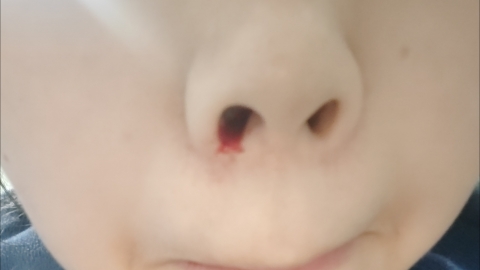What should I do if my nosebleed won't stop?
Uncontrolled nosebleeds may be caused by severe nasal mucosal damage, extremely dry air, sinusitis, thrombocytopenic purpura, leukemia, and other conditions. If bleeding persists, immediate medical attention is necessary to identify the underlying cause and initiate treatment. Detailed analysis is as follows:

1. Severe nasal mucosal damage: Intense external force or frequent aggressive nose picking can cause extensive tearing of the nasal mucosa, damaging larger blood vessels, making bleeding difficult to stop with simple pressure. Continuous pressure on the nostrils should be maintained, and medical attention should be sought promptly. Doctors may use vaseline gauze packing in the anterior nasal cavity to apply pressure and stop the bleeding, promoting healing of the damaged mucosa.
2. Extremely dry air: Prolonged exposure to low-humidity environments such as heated or air-conditioned rooms can cause significant moisture loss from the nasal mucosa, rendering it fragile and prone to rupture. Minor blood vessels may rupture and fail to heal spontaneously due to poor mucosal condition. Using a humidifier to improve environmental humidity can aid in stopping the bleeding.
3. Sinusitis: Chronic inflammation within the sinuses can lead to mucosal erosion and ulceration, reducing vascular elasticity and increasing fragility. Once ruptured, blood may not clot easily, often accompanied by symptoms such as purulent nasal discharge, headache, and reduced sense of smell. Treatment should follow medical advice to take oral antibiotics such as amoxicillin capsules or cefuroxime axetil tablets to control inflammation, combined with eucalyptus and pinene enteric soft capsules to promote drainage of sinus secretions. Topical hemostatic agents such as Yunnan Baiyao powder may be used at the bleeding site.
4. Thrombocytopenic purpura: Reduced number or impaired function of platelets leads to impaired coagulation mechanisms. Following nasal vessel rupture, insufficient platelets prevent effective clotting, causing persistent bleeding, often accompanied by skin petechiae, gum bleeding, and other symptoms. Treatment should be conducted under medical guidance with medications such as aminopeptide tablets to increase platelet count and caffeic acid tablets to enhance capillary resistance. Platelet transfusions may be necessary when required.
5. Leukemia: Abnormal proliferation of leukemic cells in the bone marrow suppresses normal hematopoietic function, leading to decreased platelet production and clotting factors. Besides persistent nosebleeds, symptoms such as anemia, fever, and swollen lymph nodes may occur. Treatment involves combination chemotherapy, commonly using medications such as cytarabine for injection, methotrexate tablets, and mercaptopurine tablets. Hematopoietic stem cell transplantation may be necessary in certain cases.
Routine care should avoid bad habits such as nose picking and forceful nose blowing, maintaining nasal moisture and cleanliness. Indoor humidity should be kept between 40% and 60%. If persistent or recurrent nosebleeds occur, immediate hospital visit is essential to determine the cause through tests such as complete blood count and coagulation function analysis, followed by appropriate treatment.





